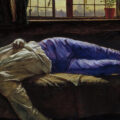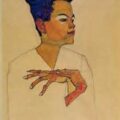A Queer Excess: the Supplication of John Wieners

John Wieners, New York City, November 1993. Photo by Allen Ginsberg.
The poetry of John Wieners is lyric, bold, shameless. It is a poetry of dereliction in the face of the artist’s almost religious devotion to verse and its inherent magic. His early work—the era between The Hotel Wentley Poems (1958) to Ace of Pentacles (1964)—swings with blues and sexual desire, the glamour of drugs and counter-cultures, gay subculture, celebrities and starlets, and tarot, all sources to feed his magical art. Wieners’s work in subsequent years contends with romantic loss and poverty, juxtaposed with moments of pleasure in sexual and gender transgression, and a political awakening in the face of state harassment and psychiatric incarceration. In his 1958 breakthrough volume, Wieners announces his radical poetics coolly, almost objectively:
I find a pillow to
muffle the sounds I make.
I am engaged in taking away
from God his sound.
The erasure of God’s articulation is achieved by the young poet’s flawed articulation of worlds that negate the very premise of an all-loving God—worlds that the popular morality of that era would certainly describe as vice-ridden, worlds that were outside the bounds of sanctioned activities. Supplication to lyric poetry, in light of the failure of God, is a necessity of survival, the “last defense” of the poet.
And I come to this
knowing the waste,
leaving the rest up to love
and its twisted faces,
my hands claw out at
only to draw back from the
blood already running there.
Wieners was born to a working class Catholic family in Milton, Massachusetts, in 1934. He attended Boston College High School and Boston College, both Catholic Jesuit institutions. After the transformative experience of hearing Charles Olson read in Boston during Hurricane Hazel in 1954, Wieners would soon write to Black Mountain College that “[I] do not know the craft of writing, which is the only use of my life.” A loan ushered him to North Carolina, into the classrooms and company of Charles Olson and Robert Creeley, while seasons away from Black Mountain in Boston would bring him into the orbits of Jack Spicer, Frank O’Hara, and Stephen Jonas, among numerous others. In 1957, Wieners relocated to San Francisco during the San Francisco Renaissance, where he met Robert Duncan and Allen Ginsberg.
Olson would remain the strongest living influence on Wieners’ poetics, and Wieners in turn infused Olson’s projective teachings with the visionary French Romanticism of Rimbaud and Baudelaire, with the classicism and isolation of Edna St. Vincent Millay, Emily Dickinson, and H. D., and above all with a poetics of sheer unbridled emotion. Robert Creeley described Wieners as “the greatest poet of emotion I have ever read.”
Between these largely queer male poetic milieu, Wieners emerged as editor of Measure, an occasional yet influential little magazine. His writing appeared in Donald Allen’s landmark anthology, The New American Poetry 1945–1960. In the 1960s, Wieners moved between Boston, New York, and Buffalo (the latter for further studies with Olson) and was widely published in journals and little magazines. He was among the readers of the Berkeley Poetry Conference in July 1965, and in 1966 the poet spectacularly failed at a long-term heterosexual romance. Wieners’s writing from this decade would culminate with 1970’s Nerves, widely considered as the poet’s finest demonstration of his lyrical powers.
“In Public”
Promise you wont forget
each time we met
we kept our clothes on
despite obvious intentions
to take them off,
seldom kissed or even slept,
talked to spend desire,
worn exhausted from regret.Continue our relationship apart
under surveillance, torture, persecuted
confinement’s theft; no must or sudden blows
when embodied spirits mingled
despite fall’s knock
we rode the great divide
of falsehood, hunger and last year
Despite this success, Wieners’s life among poets was viciously interrupted by psychiatric incarcerations and the trials of drug addiction. Such trials would be to attested in his poetry, poetry itself becoming a tool for the survival of memory and selfhood under such duress.
By 1970, Wieners had settled in Boston, amid the revolutionary energies and liberation movements of the late ’60s and early ’70s. Both Wieners and his poetry became involved in Boston’s Gay Liberation Movement, the radical gay anarchist newspaper collective Fag Rag, and the Good Gay Poets collective. The latter published his 1975 book Behind The State Capitol: or Cincinnati Pike. He was also involved in Boston’s Mental Patients’ Liberation Front, lead in the mid-1970s by the influential activist Judi Chamberlin. Wieners’s poetry emerged from these liberation movements with a transformed political consciousness that would echo in his formal innovations and in the content of his later work.

Supplication: Selected Poems of John Wieners
edited by Robert Dewhurst, Joshua Beckman, and CAConrad
Softcover, $22.00
Wave Books, 2015
After the publication of his Selected Poems 1958-1984 in 1986, and with it the sibling volume Cultural Affairs in Boston, both by Black Sparrow Press, Wieners hung in the ether of American poetry. He was anthologized yet largely out of print, retired from writing and public view, seemingly “living out the logical conclusion of [his] books.” Wieners lived a life of solitude and welfare checks on the north side of Boston’s Beacon Hill, until his death in 2002, largely unknown outside of a close circle of friends.
Wieners’s poetic legacy since his death has remained somewhat marginal. His work has been positioned in social proximity to the beats, despite considerable aesthetic differences; and it remains adjunct in the legacy of The New American Poetry, perhaps due to his deviances and lack of work in print. Wieners’s writing also remains marginal within the contemporary canon of twentieth-century LGBTQ poets— the poet becoming, in the words of Michael Rumaker, an “old invisible fag.”
Supplication: Selected Poems of John Wieners (Wave Books, 2015) is the first comprehensive volume of Wieners’s poetry to appear for nearly thirty years. Providing a chronological account of the transformations of Wieners’ writing from the mid-to-late 1950s into the 1980s, and restoring a significant amount of material into print, Supplication provides a fresh perspective on Wieners’s eclectic and idiosyncratic oeuvre, spanning the range of affective extremes that Wieners produced in verse. The crescendos of visionary poetics, and its subsequent collapse into romantic desolation, with the nuances of queer desire and embodiment, are distilled finely into two hundred pages. The volume includes selections from all of Wieners’s books alongside uncollected poems, writing from journals, and a handful of poems previously unpublished outside of little magazines.
Supplication opens with the clear influence of jazz and blues on the poet’s early intonations of pleasure. In “With Mr J. R. Morton,” Wieners’ sound approximates Billie Holliday, a lifelong influence on his rhythm and sensibility:
I wish I was a dancer
and cd. move
in feet/undo my bodyswing it out it
bangs my bubbs and belly
slide my toes in pebbles so
my nerves
wd. be taken up one by
one stretched out
tight thin to threads
and I wd. be free
inside my legs.
Desire literally swings here across short monosyllables, alliterations swaying into the half rhyme of “threads” and “legs.” Tight on alcohol, the poem sways with a free movement that undoes the poet’s body and enabling feminine expression. Supplication places Wieners’s queer- and gender-embodied poetics front and centre, “On a stage in front of beautiful eyes,” as the freedom of undoing this body treads “softly / toes like vaseline” to build erotics that fly “(over their heads),” transcending the line and iconic symbols of America with desire: “knee dips as I strip out of my – / I desire to be taken to the top of the Liberty Bell and blown.”
Wieners’s writing from the 1960s is a poetics of crisis in the face of destitution and poverty. In the loss of religious faith, Poetry itself will be the site and receipt of supplication. “I have been over the abyss before,” writes Wieners, in the desperate heroism of “The Acts of Youth”:
Do not think of the future; there is none.
But the formula all great art is made of.Pain and suffering. Give me the strength
to bear it, to enter those places where the
great animals are caged.
Abetted by the “dark eternals of the nightworld: the prostitute, the dope addict, thief and pervert,” Wieners’s deviance from social and heterosexual norms lead to repeated psychiatric incarcerations, the violence of electro-shock treatment, a diagnosis of schizophrenia, and “a paper from the state saying I am ‘a mentally ill person.’”
The VOICEs droned on. They did every afternoon,
through the soundless permeation of madness upon sanity. To
wake up and find you are saddled with a mental illness, you did
not know you had before.
But after examination, you find out it’s true.
The brutality inflicted on psychiatrized persons—which disproportionately affected women, homosexual men, and people of color—would be actively challenged by the Gay and Lesbian, Women’s, and Mental Patients’ Liberation movements, alongside critical work by prominent social theorists. This resistance eventually ushered in a period of deinstitutionalization throughout the 1970s, alongside the declassification of homosexuality from the Diagnostic and Statistical Manual of Mental Disorders (DSM) in 1973/4. Such state-sanctioned pathology, violence, and its administered drugs, alongside the fallout of addiction, are reflected in Wieners’s writing from the period. His poetic imagination returned to the body that had survived such threats. Poetry itself becomes for Wieners a tool, holding a mind and memory shattered by psychiatry and (its) drugs together, integrating the multiple voices of the poet’s mind.
I know now heard speak in the night
voices of dead loves past,Whispered instructions over electric air
confined or chained.Down deep the path’s final entrance reveals itself
in will drawn strong on the palm of hand.Do not tamper with the message there.
These are often desolate poems. The poet collapses at the altar of Poetry with bathetic irony, reflecting upon his own state. The last stanza of “Supplication” makes simple requests of Poetry:
Return me to the men who teach
and above all, cure the
hurts of wanting the impossible
through this suspended vacuum.
Gender deviance buds across Supplication, with the poet’s gender trans-gressions complexly intertwined with homosexuality, love, and psychiatric dereliction. This queer romance often situates the poet’s voice and its intonation in the feminine, as relations of desire enable or fails expressions of a feminine self. “Forthcoming” expresses such failure: “I died in loneliness / for no one cared for me enough / to become a woman for them.” Between the need of love and normative demands on the body—“why man / he doesn’t even have any teeth”—Wieners is left with memory, melodrama, and nostalgia.
Alongside public experiments with and textual allusions to drag—the word “TRANSVESTITE” appears half-obscured in a collage with an underwear advert, the legs of a table, and a headline “Watergates” in Behind the State Capitol—Wieners’ work from the 1970s onward articulates the multiple voices inhabiting the poet’s mind. This is often intoned in the form of Hollywood starlets and female celebrities. The poet’s lifelong fascination with their romantic trials on the silver screen, and with their difficult relationships with the media, is transmuted into a form of avant-garde camp: emotions and dramas literally eschewing the sense of a changed American culture. These often take the form of prose poems, made up of apparent non-sequiturs, which blur the distinction between auto/biography. “VERA LYNN,” from Behind the State Capitol, completes the poet’s contemporary retelling of the story of Mata Hari, German spy femme fatale (this version also starring Greta Garbo, as in the 1931 film):
I trust that I have some assets that may be helpful
You should be paying me
For looking the other way
…
in brining about a truly united AmericaThe firing squad, Mata Hari in center, October 15, 1917
Illustration
Such work, including poems that inhabit the voice of Jacqueline Kennedy Onassis, is perhaps underplayed in Supplication and would be published under the name Jacqueline Wieners in Fag Rag. However, Supplication importantly reprints nearly forty pages from Wieners’s 1975 Behind the State Capitol or Cincinnati Pike, a colossal work of decoupage, assemblage, and politicized verse spanning twenty-three years, whereas Ace of Pentacles (1964) and Nerves (1970) remain brief, at six and eight poems respectively, and are likely to draw complaints from some critics,
The decision to provide significant space to Behind the State Capitol highlights the editors’ estimation of this important and misunderstood volume. Published originally by Boston’s Good Gay Poets collective, the facsimile reproduction in Supplication emphasizes the importance of the book’s materiality. The texts shift between dense lines embedded with innuendo, historical referents, and intentional typos (“Prick any literay dichotomy / sung unrent gibberish from maxim skulls”) and Wieners’s characteristic, frank lyrics of queer love and desolation. Textual effects such as seemingly discrepant capitalization, spacing, and line breaks abound. Prosaic memories and meta-letters evoke high society figures, critical writing on class dominance, and moments of memoir and anxiety under the eye of state surveillance.
Ailsa Mellon Bruce
Ailsa has and wears millions of dollars worth of jewels, including
an enormous collection of sclumberger pieces. She is a great
now Ambassador to Great Britain, said to be the richest woman
in the country, has a fortune approaching a billion dollars.
Every time Gulf Oil goes up a point, her net work of jewels
give away $70,000,000, just as Daddy did, without adding
another piece—$3,000,000 to David K. E. Bruce, her United
States.…
How can a poor person matter in this world? Rising out of an
uneducated environment, bearing the resentment of his parents
towards all he meets and resting upon a religion that fosters
guilt and repression, where in what hope may he escape?
Supported by an economy that
can only further enslave him and prompts him to social despair,
what avenues allow him at least the leisure to honor the labor of
his grandfathers, and to appreciate the achievements of his
oppressed mother & father, in their dignity and outward appear-
ance.
The works are littered with dates, interspersed with collaged photographs of Hollywood starlets, gossip columns, and newspaper headlines. They are rooted in a specific historical moment, from which the radicalized poet can reconstitute a life and a body. Part of a letter from then–Vice President Gerald Ford—thanking Wieners for his presumably ironic congratulations for obtaining this position—cuts across the texts, to the effect of signing his name at the end of a poem. Ephemera permeates the text such as Wieners’s Boston Public Library reader card and an illustration of a man receiving head.
The restoration of Behind the State Capitol’s pages also spotlights the volume’s importance as a product of Gay Liberation’s radical media. Wieners’s involvement in the Gay Liberation movement (in Boston and beyond), in the radical gay anarchist newspaper Fag Rag, and in Boston’s Mental Patients’ Liberation Front, has been largely overlooked, or fundamentally misunderstood, in recent critical writing on the poet. As a product of the Good Gay Poets collective, Behind the State Capitol combines a Rimbaudian “systematized disorganization of all the senses” with the politics and cultural transformations of Gay Revolution.
While the book’s reception (or lack of it) seemed to indicate the poet’s fall from grace—a fall into the depths of schizophrenia accompanied by an uncritical naturalisation of this pathology into the aesthetics of the work itself—the book emerged from and spoke directly to a radical gay politics that directly enabled this transformed and expressive poetics. It pushes a social critique of heteronormative society, the state, psychiatry and religion into new aesthetic forms, undermining questions about what is permissible for publication as poetry.
Such radical gay politics was an immediate target of state and violent social repression in a conflicted, increasingly conservative Boston. In 1982, arsonists attacked the shared location of Boston’s Fag Rag, Gay Community News, and gay bookshop. The attack was rumored to have been instigated by off-duty fireman and police officers after Fag Rag led a demonstration for the abolition of the police. The fire destroyed, among other things, the Good Gay Poets stock—including the remaining 750 copies of Behind the State Capitol, effectively putting the book out of print.
Such events pushed Wieners to new heights of political poetics. In “C H I L DREN OF THE WORKING CLASS,” the poet challenges God by constructing a litany of embodiments of those socially dejected by psychiatry, a testament not of “God’s goodness, but his better or less scorn.” “I am one of them,” writes Wieners, understanding his position among American society’s condemned underclasses, “locked in Taunton State Hospital and other peon work farms.” “Viva,” one of a number of poems from the early 1970s, freshly illuminated in Supplication, captures Wieners’ radical politics acutely and viciously, leaving not even the familial dead of white heterosexual capitalist society undisturbed:
Drag them out of their places,
for they block the progress of our lives, our times,
drag them out of their graves,
even if they were our parents,
for they barricade the streets of our protest, our loves;contaminate afternoons with lanterns from poems
by questions of industry and idleness,
White America is literally preventing a liberated future for those it has exiled according to class, race, sexuality, gender, and embodiment. Even the “graves” of white Americans form a half rhyme with “barricade,” preventing the public demonstration of gay politics and desires. Their dead block the transformation of life; and their living “breed death and young graves,” and furthermore “heartless despair” for oppressed peoples—all aspects of sufferance Wieners attests to in this volume. The poem closes with a denunciation of their values, piling up alliterative consonants with the plagues of capitalist society: “Stealing beneath bosoms to fester automatically in leeches / As enormous tumours out from the poverty of their lusts.”
Supplication is an important volume, one that should place Wieners back into the canon of twentieth-century American poetic innovation. Along with the forthcoming volume of selected journals from City Lights, Stars Seen In Person, and the potential for an edition of collected poems (under the editorship of Robbie Dewhurst), Wieners’s oeuvre is being recovered for familiar audiences and new generations of readers alike. This is a poetry that pledges a timeless devotion to poetry, for survival from conditions imminently historical to the poet. The essay that closes the volume, “The Lanterns Along the Wall,” presents Wieners’s poetics as a protective aura that offers the possibility of transcendent joy. Supplication ends the posthumous era of exile for this misunderstood poet, steadying a flame of aesthetic devotion and poetic deviance for the audiences he long imagined.
About Nat Raha
Nat Raha is a poet and queer / trans* activist living in South London, UK. Her poetry includes countersonnets (Contraband Books, 2013), Octet (Veer Books, 2010) and [of sirens / body & faultlines] (sociopathetic distro, 2015). Her work has been published in numerous journals and she has performed internationally. She is currently undertaking at PhD on Marxism in queer theory, and contemporary poetry, at the University of Sussex, UK.





